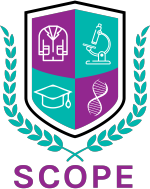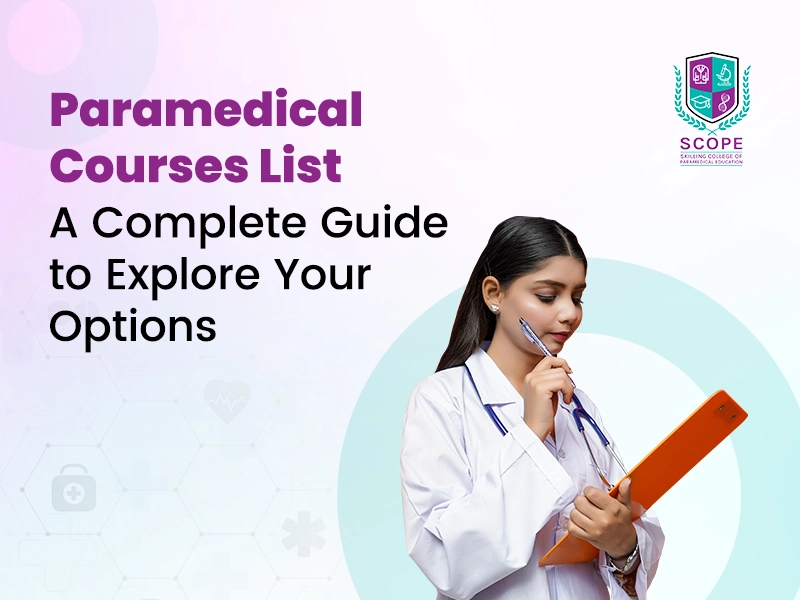The healthcare industry thrives on skilled professionals who support doctors, nurses, and other specialists in delivering seamless patient care. Paramedical courses offer the perfect pathway to becoming an essential part of this dynamic sector. Whether you’re drawn to diagnostics, nursing, or patient care, this guide provides a detailed paramedical courses list and insights to help you choose the best career path. SCOPE College, with its state-of-the-art facilities and job-oriented programs, is a trusted name for pursuing paramedical education.
What is a Paramedical Course?
Paramedical courses are specialized training programs that equip students with practical skills to support medical professionals in diagnostics, treatment, and patient care. Unlike traditional medical degrees, paramedical courses focus on specific technical roles in healthcare, making them ideal for students seeking faster entry into the industry. These programs are vital for bridging gaps in healthcare delivery.
Curious to know more? Explore What Are the Paramedical Courses? for a comprehensive explanation.
Benefits of Paramedical Courses
- Faster Career Path: Most paramedical programs are shorter in duration, allowing you to start your career quickly.
- Accessible Without NEET: Many paramedical courses without NEET make healthcare careers more inclusive and accessible.
- High Demand: With an ever-expanding healthcare industry, paramedical professionals are highly sought after in hospitals, diagnostic labs, and research centers.
If you’re interested in high-paying roles, don’t miss High-Salary Medical Careers Without NEET.
Paramedical Courses List: Detailed Guide
1. Medical Laboratory Technology Courses
-
Advanced Diploma in Medical Lab Technology
This program is designed for students aiming to specialize in diagnostic lab procedures. The curriculum covers microbiology, clinical pathology, add histopathology, immunology, clinical biochemistry also enabling graduates to work in advanced diagnostic labs or research facilities.
Interested in diagnostics? Learn more about Pathology Courses After 12th -
BSc in Medical Laboratory Technology
This three-year degree focuses on laboratory techniques, research methodologies, and quality control processes. It prepares students for leadership roles in labs and diagnostic centers.
-
Bachelor of Vocation in Medical Lab Technology
This vocational course emphasizes skill development and real-world application, making it an excellent choice for students looking for a practical approach to medical lab sciences.
-
Diploma Course in Medical Laboratory Technology
A two-year program that provides hands-on training in diagnostic techniques like biochemistry and hematology. This course is ideal for students looking for quick entry into the healthcare field.
-
Certification in Medical Laboratory Technology
A 1-year Program focusing on the basics of lab diagnostics. It’s perfect for those seeking foundational skills for entry-level roles in healthcare.
Want to explore high-scope courses? Check out What Is BSc MLT?
2. Radiology and Imaging Technology Courses
-
Bachelor of Vocational in Radiology and Medical Imaging Technology
This advanced program teaches students to operate radiology equipment like X-ray, MRI, mammography, ECG, and CT machines. Students gain expertise in imaging techniques critical for diagnosing internal medical conditions.
Dive deeper into this field with Radiology Courses After 12th. -
Certificate Course in Radiology Technician
This 1-year course provides technical training in radiographic procedures. Graduates can work as assistants in radiology departments.
-
X-Ray Technician
Specializing in X-ray operations, this course equips students to assist doctors in diagnosing fractures and internal injuries..
-
Certification in MRI Technician
Focuses on the operation and maintenance of MRI machines, this course is ideal for students passionate about diagnostic imaging.
3. Cardiology and Dialysis Technology Courses
-
Diploma in Cardiology Technician
This program focuses on assisting cardiologists with procedures like ECGs, stress tests, and cardiac monitoring. Students are trained in advanced cardiology technologies.
-
Diploma in Dialysis Technology
This course prepares students to operate dialysis machines and manage patient care during treatment. With the rising demand for dialysis care, this is a promising career choice.
For related career paths, read How to Become a Cardiac Technician
4. Nursing and Patient Care Courses
-
Certificate in General Nursing & Midwifery Assistant
This program provides foundational nursing training, focusing on assisting nurses in delivering efficient patient care. Students learn to handle medical records, administer medications, and assist in childbirth.
-
Certification in General Duty Assistant
A short course designed for those passionate about caregiving. This program trains students to assist in basic patient care activities like feeding, bathing, and mobility.
Learn more about its scope in What Is GDA?
Why Choose SCOPE College?
SCOPE College offers industry-leading paramedical programs with several unique advantages:
- Advanced Lab Facilities: Hands-on experience with modern equipment.
- 100% Placement Support: Partnerships with top hospitals and clinics.
- 100+ Placement partners: Practical exposure during training.
- Blended Learning: Flexible options combining online and offline classes.
- Weekend Batches: Perfect for working professionals or degree students.
Chart Your Path with SCOPE College
Choosing a paramedical course is the first step toward a rewarding healthcare career. With the expertise of SCOPE College, you’re guaranteed quality education and exceptional job opportunities.
Explore the full range of courses here or contact us to speak to our career counselors. Ready to enroll? Register now and take the first step toward your dream career!
FAQs
1. Does paramedical courses need NEET?
No, paramedical courses at SCOPE College do not require NEET. The programs are accessible to students with a strong interest in healthcare, offering an alternative pathway without competitive entrance exams.
2. Which is the best course of paramedical?
The best paramedical course at SCOPE College depends on your personal interests and career aspirations. With a range of options focused on diagnostics, patient care, and technical expertise, the college ensures every student finds the right fit for a successful healthcare career.
3. Who is eligible for paramedical courses?
Eligibility for paramedical courses at SCOPE College is designed to be inclusive. Whether you are a 10th or 12th pass student, or even a working professional seeking to enhance your skills, the college provides flexible learning options, including weekend batches to suit your schedule.
4. What is the highest-paid paramedic job?
Graduates from SCOPE College often secure high-paying roles in diagnostic, technical, and therapeutic fields within the healthcare sector. The exact salary depends on the specialization and experience, but paramedical professionals are consistently in demand.
5. How long is the paramedical course?
The duration of paramedical courses at SCOPE College varies based on the program. Certificate courses typically last 6 months to 1 year, diploma courses 1 to 2 years, and degree programs up to 3 years, ensuring a flexible timeline for students and professionals alike.

